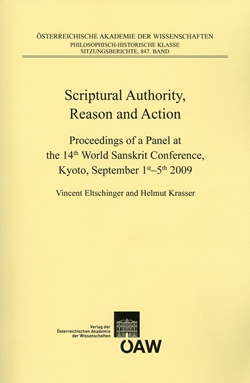Vincent Eltschinger
is research fellow at the Austrian Academy of Sciences and a guest professor at various universities
Helmut Krasser
is the director of the Institute for the Cultural and Intellectual History of Asia of the Austrian Academy of Sciences and associate professor at the Department of South-Asian, Tibetan and Buddhist Studies at the University of Vienna
|
 |
ISBN 978-3-7001-7551-3 Print Edition
ISBN 978-3-7001-7573-5 Online Edition
Beiträge zur Kultur- und Geistesgeschichte Asiens 79
Sitzungsberichte der phil.-hist. Klasse 847
2013,
485 Seiten, 24x15cm, broschiert
€
67,70
The present volume is the outcome of the panel “Scriptural Authority and Apologetics in the Indian Religio-Philosophical Environment” held in the framework of the 14th World Sanskrit Conference (Kyoto, September 2, 2009). It contains eleven essays by specialists in the fields of Mahāyāna Buddhism (P. Skilling, R. Walser), Buddhist epistemology (V. Eltschinger, H. Krasser, S. Moriyama, S. McClintock), Jainism (P. Balcerowicz), Mīmāṃsā and early Vedānta (K. Kataoka, H. David), and Pratyabhijñā philosophy (I. Ratié, R. Torella). The topics dealt with range from different symbolic, esthetic and institutional means of scriptural authorization (the long tongue of the Buddha, the preaching dais) to theories of rational choice in ethical-soteriological matters, from “inclusivism” to the critique of competing claims to the perception of the supersensible. Besides presenting in-depth contributions on little studied areas of Indian philosophy, this volume sheds unprecedented light on the diversity, persistence and structural homogeneity of the philosophers’ enquiries into the legitimacy and the modalities of religious authority and scriptural testimony. It also bears witness to the strong impact of religious pluralism and competition on the nature and the agenda of Indian philosophy.
Der vorliegende Band ist das Ergebnis des Panels “Scriptural Authority and Apologetics in the Indian Religio-Philosophical Environment”, das im Rahmen der 14. World Sanskrit Conference (Kyoto, 2. September 2009) stattfand. Er enthält elf Aufsätze von SpezialistInnen auf den Gebieten des Mahāyāna-Buddhismus (P. Skilling, R. Walser), buddhistischer Epistemologie (V. Eltschinger, H. Krasser, S. Moriyama, S. McClintock), Jainismus (P. Balcerowicz), Mīmāṃsā und früher Vedānta (K. Kataoka, H. David) sowie der Pratyabhijñā-Philosophie (I. Ratié, R. Torella). Die Themen der Aufsätze reichen dabei von verschiedenen symbolischen, ästhetischen und institutionellen Mitteln schriftlicher Autorisierung (die lange Zunge des Buddhas, die Gebetskanzel) zu Rational-Choice-Theorien in ethisch-soteriologischen Angelegenheiten, von „Inklusivismus“ zu der Kritik an konkurrierenden Ansprüchen auf die Wahrnehmung des Übersinnlichen. Neben detaillierten Beiträgen zu kaum erforschten Bereichen der indischen Philosophie liefert dieser Band beispiellose Einblicke in die Vielfalt, Beständigkeit und strukturelle Homogenität der indischen Untersuchungen zu Legitimität und Modalität religiöser Autorität und schriftlicher Zeugnisse. Ebenso offenbart er, dass religiöser Pluralismus und Wettbewerb große Auswirkungen auf das Wesen und die Ziele indischer Philosophie haben.
|




